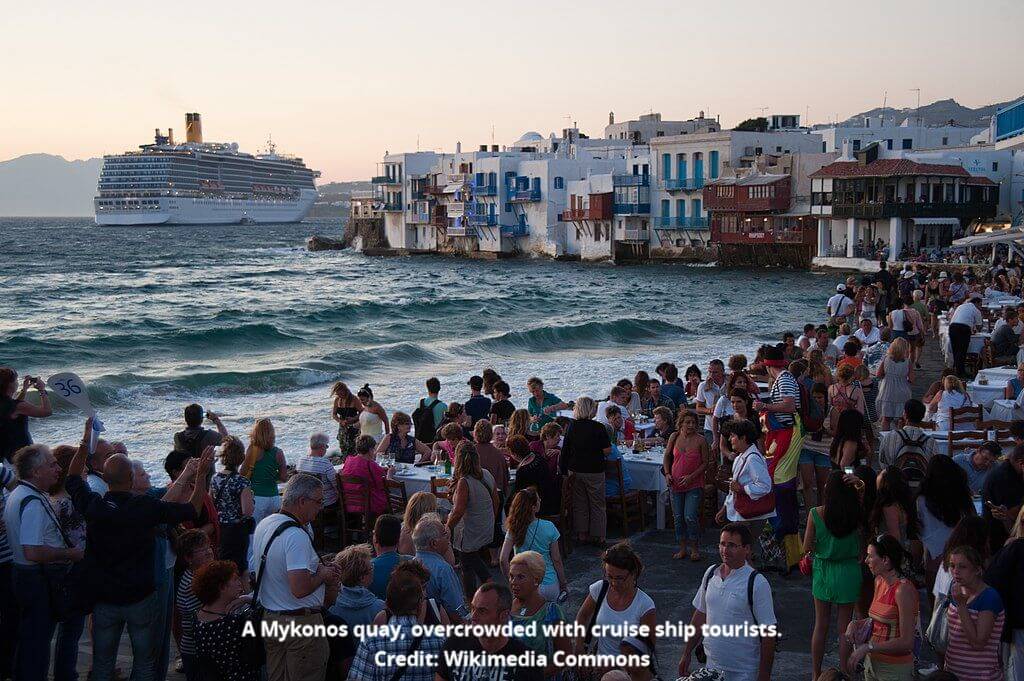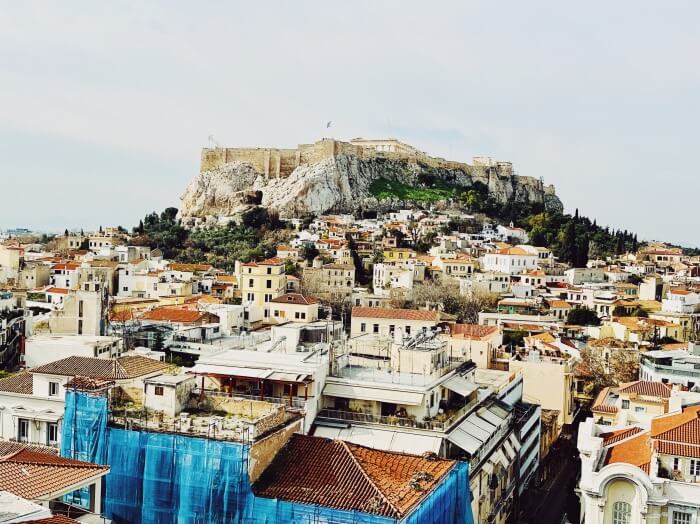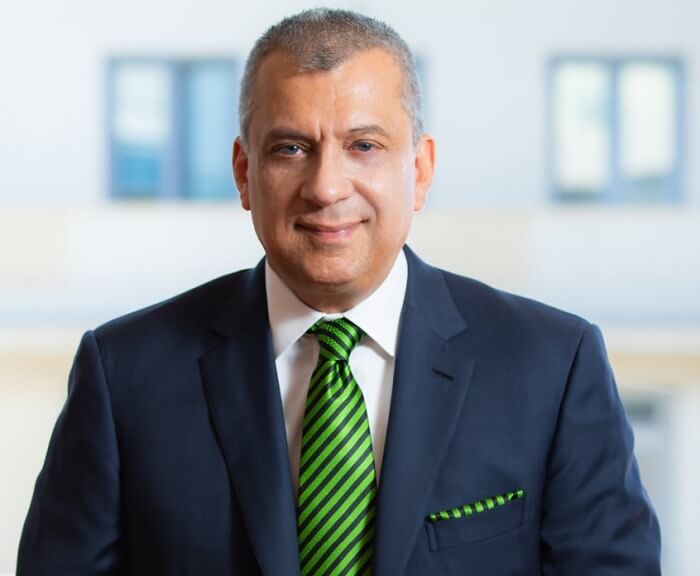Sorry, Europe Is Full, Tourists Are Told

News Analysis With a Sense of Humor


The people of the world are planning to descend on Europe this summer. Not, I hasten to say, as migrants but as tourists.
They will jam the sidewalks of Paris, their buses will be bumper-to-bumper in England’s Lake District, and it will be nigh impossible to get into Venice.
It isn’t that Europe is too small to accommodate the surge of tourists but that a few sights are too popular with tourists from the West and now tourists from China. The history and culture of Europe are a magnet, drawing and delivering for tourists, whether they are first-timers or bucket-listers.
Greece is a jewel in this crown, a place of sparkling wonder of human endeavor and natural formations. The country is ground zero for Western civilization, where visitors can trace the origins of Western arts and sciences, as well as democracy. Visitors can also experience the natural beauty of its coasts, mountains and islands.
I met with the Greek minister of tourism, Olga Kefalogianni, in Athens last month, and we discussed the blessings and challenges of tourism, including the problem of what some call “overtourism.” Not only has Greece attracted tourists for millennia, but it also has a huge capacity to absorb visitors. It would just like to spread them out over the year and the country.
Clearly, Kefalogianni loves her job and was, to an extent, born to it. She is the scion of a very prominent Greek family that owns hotels in Crete, the largest and one of the most inviting of the Greek islands.
The last thing Kefalogianni, who did a stint as a lawyer in New York, wants to do is to discourage tourism. It accounts for 20 percent of Greece’s economy, and the country can absorb untold hundreds of thousands more tourists than it already does.
But there are choke points. And in future planning, the minister told me, she is working to enhance the industry by promoting Greek food, wine and its wide-open spaces for safe outdoor recreation like hiking, climbing and canoeing.
The first thing, she said, is to tell the world how diverse Greece is and how much it has to offer not only in terms of its history but also natural beauty and simple things like walking in its villages.
She wants visitors to spread out and enjoy all of Greece. “Do you know you can ski in Greece?” she asked me. Indeed, the country has 25 ski resorts.
She also said Europe has much to offer year-round besides the summer. In truth, the summer in southern Europe can be extremely hot.
One challenge for the Mediterranean ports is the cruise ships, which are now to be found all over the sea: vast, floating cities with eager sightseers, keen to disembark and spend a few hours in a destination.
They are becoming a challenge for host countries. They dock and disgorge their eager passengers, but they bring problems, from pollution to stressed port infrastructure. Also, the cruisers are ashore so briefly that they spend very little money, considering how many there are: Many prefer to eat all their meals on board, and their principal expenditure is on souvenirs and bus tours.
The cruise ships need more regulation, Kefalogianni said. Recently, I observed the problem firsthand. I — yes, on a cruise — fetched up in Santorini when five other huge ships did likewise. A cable car (or foot or donkey) at the port takes people up and down from Fira, the island’s capital. Well, with thousands in line, the result was chaos. Instead of a visit to a heavenly place, it was a version of hell.
Also, Greece and other European countries’ cities want the ships to base at their ports, provision there, and embark and disembark their passengers there. The beneficial economic effect would be greater that way.
The tourism minister wants visitors to know that Greece (and I would add the rest of tourist-haven Europe) has year-round attractions. She noted that the shoulder seasons of spring and fall offer all the summer attractions with fewer people. On the mainland and on the Greek islands — there are 6,000 of them; 227 are inhabited and 100 have more developed tourism facilities — you can swim early in the year and late as well. In February, I saw people swimming at a beach near Athens. They allowed the water to be cold, but not impossibly cold.
Mediterranean Europe is a place for all seasons. As the British writer Christopher Hitchens told me once, “It’s where it all began.”

If you hold a professional certificate, whether it is for information technology or language proficiency, or if you hold one for best practices in project management, you may have a Greek entrepreneur to thank.
He is Byron Nicolaides, founder and CEO of PeopleCert, the global testing company in Athens.
I sat down with him in his office in the city’s center recently to find out how a businessman in Greece could affect standards of conduct and performance around the world.
It is a tale that begins with a very poor Greek family living in Istanbul — Nicolaides uses the old name for the Turkish capital, Constantinople, where once, he said, there was a community of more than 100,000 Greeks, which has dwindled to just 2,000 today.
His parents were English teachers and had no fixed incomes. “Sometimes,” he said, “they would be paid in kind with a chicken or some bread.”
From this poverty, their son, Byron, became one of the richest men in Greece or Turkey. The company he created in 2000 is a global leader in professional and language skills certification. In 2021, it became the first Greek unicorn, reaching a capital value of more than $1 billion.
Note that his parents were English teachers — and this is important.
As I talked to Nicolaides, he was enthusiastic about the universality of English and how it has been a unifying force in the world. No worry about how English may crush marginal but traditional languages.
Nicolaides is passionate about English. Without it, he wouldn’t be the success he is today. He sees it as a great binding force, an excellent way for peoples and nations to talk to one another and to avoid friction. He wants everyone to know English.
He asked me, “What is the second-biggest language in the world?” I look at the ceiling and start thinking about two countries with large populations, India and China. I say uncertainly, “Hindi.”
With boyish happiness, Nicolaides, a young 65 of athletic build and a full head of hair, says, “Bad English.”
His enthusiasm for the English language becomes a man whose company tests English proficiency worldwide — and he lists Fortune 500 companies (including Goldman Sachs and Citibank), NASA, the FBI, the CIA, universities and other institutions.
As Nicolaides unspools his life story, one is captivated by how a poor boy of Greek heritage made his way to Bosphorus University, where he earned a degree in business administration, and then to the University of La Verne in Southern California, where he earned a master’s.
Whereas Nicolaides’ upbringing and education in Turkey might seem to be a challenge — Turkey and Greece are seldom on the best of terms — it has been a great advantage to him.
His break was in 1986, when he went to work for Merrill Lynch in Greece, becoming its highest earner. The company sought someone to open the Turkish market, offering a $5,000 to $10,000 signing bonus. Nicolaides took the bonus, and the job made him a millionaire by age 31.
At that point, he told me he had more money than he knew what to do with it, so he did the thing all Greeks with money do: “I went into shipping.”
Nicolaides spent a year in the shipping industry and hated it. He said the only thing all the other shipping millionaires could talk about was “money, money, money.” Although he has much, much more money today, he feels he is helping humanity with the educational purpose of PeopleCert.
If he lucked out beyond expectations with Merrill Lynch, he also lucked out with British Prime Minister Margaret Thatcher, albeit indirectly.
During the Falklands War, Nicolaides said, the Iron Lady was appalled at the lack of interoperability between the British forces. She demanded the introduction of the kind of best practices and certification which later became a pillar of PeopleCert.
Thatcher’s requirement was developed by a British company in which Nicolaides had an investment. Later, he bought that company, and PeopleCert became unstoppable: It has certified 7 million people worldwide and is growing at 36 percent a year.
Reflecting on this odyssey by a golden Greek, I realize that native English speakers start with a huge advantage in that the world is open in a way that it isn’t to those who don’t speak English.
When I first visited Athens in the 1960s, getting around depended on finding an English speaker. They were few and far between. Today, everyone seems to speak English, and well.

From Israel, there is good news and bad news.
The good news – and it is huge – is that Israel will soon be awash in natural gas. Gas discovered on the country’s outer continental shelf will turn the country from being hydrocarbon-deprived to being a net exporter.
Indeed, Israel is set to become so rich that it is laying the groundwork for creating a sovereign wealth fund for overseas investments in order to protect the country from inflation and the shekel from getting too strong.
The bad news is that with Hezbollah poised to control Lebanon’s government, Iran has de facto arrived on Israel’s northern border. Even without an Iranian nuclear weapon, this is a grave deterioration in Israel’s security.
Already Lebanon has asked the United Nations to guarantee that Israel does not violate the integrity of Lebanon’s outer continental shelf, where Iran plans to help Lebanon drill for gas.
Geology is about to change the political geography of the world’s most combustible neighborhood.
The two huge gas discoveries are in the Tamar and Leviathan fields. Taken together, the gas reserves are estimated at 26 trillion cubic feet or 10 times larger than Britain’s North Sea discoveries.
Since its creation in 1948, Israel has drilled on land for oil and gas with very little success. While the Arab Gulf countries have found and produced massive quantities of oil and gas, Israel has scrounged in the international markets for its hydrocarbons, including coal. But its isolation has made this difficult and expensive.
In recent years, Israel has bought gas from Egypt. Now Egypt will lose its good customer.
Turkey, Israel’s only Moslem friend until the botched seizure of a humanitarian ship bound for blockaded Gaza, will be affected too. There were plans for a pipeline that would carry gas from Azerbaijan across Turkey and undersea to Israel. That economic boost will not go to Turkey, but instead will probably go to Greece and Greek Cyprus. There have been preliminary discussions between Israel and Greece about shipping gas through Greece–by an undersea pipeline or a liquefied natural gas train–as an entry point into Europe.
Cyprus is a possible export-staging destination, as the Leviathan field, 86 miles off the Israeli coast, is nearby. But Turkish Cyprus, on the north side of the island, is not onboard.
The Tamar field is 50 miles off the Israeli coast and there are two smaller fields, potentially subject to claim by a free Gaza or a Palestinian state.
The gas will change Israel itself. Its defense force will have to defend the gas installations and the miles of pipes, pumps and other infrastructure. Israel has no domestic heating market, so all the new gas bounty will go to electric generation. The government hopes to make Israel the first 100-percent electric car country and the new gas will speed that transformation.
Credit for the Eastern Mediterranean gas discoveries goes to Houston-based Noble Energy. It is the technical leader in a consortium of Israeli companies. Now the world wants in before a whiff of the new gas has come onshore. Gazprom, Russia’s gas behemoth is keen to have a piece as an investment and to protect its European markets.
The Israeli government expects an influx of U.S. and European companies to supply piping, pumps, controllers and construction equipment and materials. It is not just private companies that are salivating: The Jerusalem government has just passed a law to tax gas profits at 62 percent.
Israel’s hostile neighbors want in too. The Eastern Mediterranean is in play in an area where play is rough.